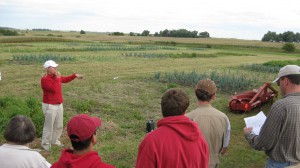An organic researcher perspective on organic check-off funds
Organic agriculture research has traditionally been underfunded leaving organic farmers with very few tools to address agronomic challenges compared to their conventional counterparts. A recently published article written by Drs. Kathleen Delate and Jessica Shade delve into how an organic check-off funds have the potential to play an important role in increasing research that will address some of U.S. organic farmer’s most pressing needs. Research is desperately needed to provide organic farmers with evidence based recommendations for tackling weed and pest problems which can drastically reduce yields, breeding new crop cultivars adapted to organic production systems, and developing new techniques and technologies to reduce agricultural environmental impacts. The proposed organic check-off designates up to 75% of the funds for research and research related activities that would not only provide research funding to develop solutions for current on-farm challenges but would also allow the organic industry to leverage many federal research dollars than is currently possible. Many competitive USDA grant programs now require matching dollars for research proposals that are not submitted by public universities. Check-off funds could provide a clear path to ensure that matching requirements are met while simultaneously leveraging federal funds to double the total amount or organic research investment. Furthermore, a pool of funds directly available to provide matching funds will also allow the organic sector to direct federal grant making priorities through programs open only to check-offs and commodity boards. Without a check-off program the organic industry has limited ability to direct the use of federal research dollars. Research funding through an organic check-off is critical because it provides an avenue to fund scientific research that will help organic farmers develop advanced methods and tools to accelerate the adoption of organic practices, and boost organic production.


